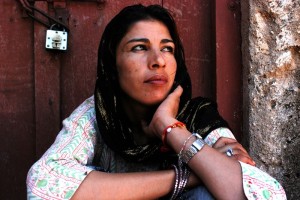The subject of the documentary, Rafea: Solar Mama, is a Bedouin woman’s quest to reinvent herself as a contemporary woman. Directed by Mona Eldaief and Jehane Noujaim,(The Control Room), this film takes a look at how traditional values often undermine human rights, especially in impoverished villages.

The film is part of the global documentary project ‘Why Poverty?’ which uses film to get people talking about the global issue of poverty.
Audiences get a glimpse into the life of Rafea Anad—a Bedouin woman who lives in one of Jordan’s poorest desert communities.
Anad’s daily life is a struggle. She lives in a tent with her four daughters and without modern conveniences.
Her husband is an unemployed polygamist who spends most of his time with his first wife. Anad is 32 years old and has only five years of primary school training.
“A girl is not allowed to continue school past the age of ten. It is considered shameful,” she says.
Anad has a desire to learn and become an innovator, but she has seen this desire extinguished over and over again by the traditions of her culture.
However, things change when Anad is offered the chance to transform her village into being sustainable and self-sufficient when she is asked to attend the Barefoot College in India. Barefoot College’s program trains middle-aged women from poverty stricken areas to become solar engineers, in the hope that they will become agents of change for their communities. Anad thus embarks on a journey that could revolutionize the role of women in her village but her husband’s oppressive nature poses a constant obstacle.
The filmmakers found the perfect hero in Anad. Her beguiling personality is what helps shape the documentary into the telling story that it is. Despite the unfair circumstances she has had to endure her entire life, Anad refuses to have her spirit shattered.
“I know you think I’m a joke and full of hot air but I will prove you wrong,” she says to her mother.
Audiences witness a transformation in Anad’s character. At the beginning of the documentary, she is a victim of her chauvinistic husband’s threats but the experience in India sparks a change within her. She returns to Jordan with a newfound sense of confidence that she can better the situation in her village. Her admirable perseverance is what makes her the undisputed star of the documentary.
Eldaief and Noujaim do a great job of exemplifying the rift in equality between men and women of traditional, remote communities.
Rafea: Solar Mama puts forth shocking words spoken by the Bedouin women that might seem out-dated to our ears.
“It’s a better life for a woman to stay at home with her kids,” says Anad’s mother.
Every scene captured is powerful. One of the most inspirational moments bears witness to the solidarity between the women from different corners of the world, attending Barefoot College. This scene empowers Anad’s mission. It proves that there are many women who share in the same plight, ready to break barriers and defy all odds for a better future.
Rafea: Solar Mama is an inspiring documentary that provides an interesting look into a world so alien from our own Western milieu.
Rafea: Solar Mama will have its Quebec premiere screening as part of Cinema Politica on Friday, Nov. 22, at 7 p.m. at J.A. de Sève Cinema — 1400 de Maisonneuve W.
Other works by director Jehane Noujaim include The Square. Read the review here (please link to The Square article).
OR: You can hyperlink The Square article to Jehane Noujaim’s name in the article (highlighted in dark green).




